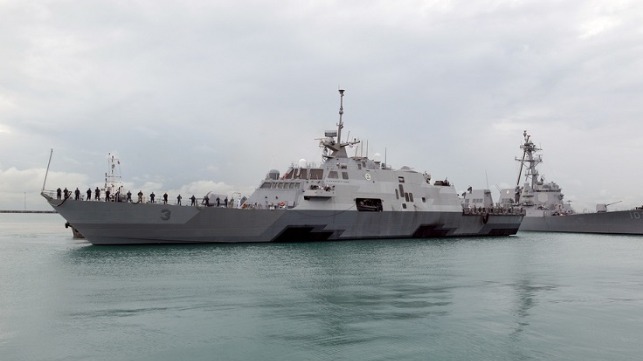U.S. Navy Makes Progress on Littoral Combat Ship Maintenance

After a long string of controversies, the U.S. Navy has some good news about its fleet of Littoral Combat Ships. It has accepted delivery of its first repaired Freedom-class LCS, the mark of final approval for a class-wide fix for the vessel's breakdown-prone combining gear.
The small Freedom-class surface combatant is intended for high-speed operations in shallow coastal waters. Top to bottom, the LCS was designed around a Navy speed requirement of 40-plus knots, about 30 percent faster than an Arleigh Burke-class destroyer. The Freedom-class' thin armor, light armament, waterjet drive and combined diesel and gas (CODAG) propulsion system were all selected with this jetboat-like speed target in mind.
The Freedom-class' propulsion system contains a sophisticated combining gear, which connects the final drive with one of three power options: her diesel engines for slow speeds, or her gas turbine engines for high speeds, or all of her diesel and turbine engines for top speed. It is a common gearbox arrangement for a naval vessel, and it was selected as a practical way to achieve the speed requirement.
However, the combining gear design has proven unreliable in service. In 2013, the first-in-class USS Freedom sustained three mechanical breakdowns on a transit to Singapore, then several more during her deployment. In 2015, the USS Milwaukee sustained a combining gear failure due to clutch slippage while under way in the Atlantic, one month after she was delivered. The following year, USS Fort Worth suffered a human error-related bearing failure in her combining gear.
In 2020, the Freedom-class LCS USS Detroit sustained a propulsion casualty related to her combining gears while under way, then lost all power. After this casualty, the U.S. Navy launched a root cause investigation with the gearbox OEM and with Lockheed Martin, the vessel's designer. They found a class-wide problem related to "high speed clutch bearings failing prematurely."
After discovering this "material defect," the Navy limited its current Freedom-class LCS fleet to a top speed of 34 knots until the issue is fixed. It also suspended all deliveries of new Freedom-class LCS hulls until its contractors could find and implement a solution.
This week, the Navy's leadership announced that the fix has been found. It will be a heavy lift to implement across the class, but the service is satisfied that it will work, according to PEO Unmanned and Small Combatants commander Rear Adm. Casey Moton.
The first vessel to receive the fix was the USS Minneapolis-St.Paul. Moton told Defense News that it took six months to remove all of the unrelated parts and equipment in order to access the gearbox, then make the repair, put everything back together and conduct sea trials. The results were satisfactory, Rear Adm. Moton said.
Next, the Navy and Lockheed will have to repair four more ships in the construction pipeline - LCS 23, 25, 27 and 29 - and come up with a plan for how to repair the ships that are already in service. They will also have to come to an agreement on cost-sharing, according to Defense News.
Operational success for Independence-class LCS
The Freedom-class LCS has stayed closer to home in recent years, but the Independence-class - an entirely different ship - is seeing extensive service in the Indo-Pacific, right where the Navy needs it most.
Three Independence-class LCS hulls are currently operating out of Singapore, conducting exercises with American forces all over the region. Capt. Tom Ogden, the commodore of Destroyer Squadron 7, said that the three vessels are benefitting from new active-duty Navy "maintenance execution teams," which are augmenting the private contractor teams that previously handled most LCS maintenance overseas.
"With the same amount of time committed to doing maintenance, we have increased the operational availability of LCS in the Pacific higher than we’ve ever seen it," Ogden told USNI.
